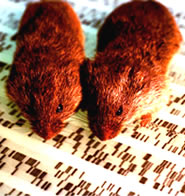Viral gene therapy makes males more faithful and friendly

Vole mates: gene makes males more receptive. <br>© L. Pitkow et al.
Spells and incantations step aside: scientists have found a genetic elixir of love. It makes males more faithful to females and more friendly to fellow males. It could also shed light on bonding disorders such as autism.
Larry Young of Emory University in Georgia and colleagues used a virus to deliver a gene straight to the part of voles’ brains responsible for rewards and addiction, the ventral pallidum. The gene made the animals’ brains more receptive to the hormone vasopressin1.
“Something about having more vasopressin receptors makes interacting with another individual more rewarding,” says Young. The ventral pallidum, at the bottom front of vole and human brains, is believed to reinforce pleasurable experiences.
Male voles were placed in a cage with a female for 17 hours, then caged with that female and another similar female. Gene-treated voles much preferred the known female. Untreated voles, or those given the gene in a different brain region, showed no preference.
This is the first time a virus carrying a gene to the brain has changed a complex behaviour, says Stafford Lightman, a hormone specialist at Bristol University. “It’s quite remarkable, and almost frightening, that you can change bonding behaviour just by changing this one receptor,” he says.
Young speculates that a dearth of vasopressin receptors in the ventral pallidum could be a cause of autism, a condition that hampers people from bonding with others. “Problems with this system could be responsible for some of these social deficits,” he says.
Addicted to love
Human brain-imaging research has implicated the ventral pallidum in romantic love and in drug addiction. It’s not surprising that the same region might be responsible for both, Young says: “People have always thought of love as an addiction.”
Experiments show that animals in cages with striped walls injected with cocaine into their ventral pallidum seek out striped walls. They associate the wall pattern with the euphoria of the drug, Young says.
“Perhaps pair bonding is a similar thing,” he suggests. “When a vole mates with a female, vasopressin is released in his brain, which stimulates the ventral pallidum. He gets a reward, and associates it with that female.”
Vasopressin may also be associated with anxiety. Voles given the vasopressin receptor gene in the ventral pallidum were more anxious than normal: they ventured out into the open less often.
“This helps explain something we already know: that attachments often happen after a stressful experience,” says Sue Carter of the University of Illinois, Chicago, who specializes in rodent and human hormones.
“Hormones released when animals are stressed could pave the way for new relationships,” she says. “Animals form social bonds when they need them.”
References
- Pitkow, L. et al. Facilitation of affiliation and pair-bond formation by vasopressin receptor gene transfer into the ventral forebrain of a monogamous vole. Journal of Neuroscience, 21(18), 7392 – 7396, (2001).
Media Contact
More Information:
http://www.nature.com/nsu/010927/010927-4.htmlAll latest news from the category: Life Sciences and Chemistry
Articles and reports from the Life Sciences and chemistry area deal with applied and basic research into modern biology, chemistry and human medicine.
Valuable information can be found on a range of life sciences fields including bacteriology, biochemistry, bionics, bioinformatics, biophysics, biotechnology, genetics, geobotany, human biology, marine biology, microbiology, molecular biology, cellular biology, zoology, bioinorganic chemistry, microchemistry and environmental chemistry.
Newest articles

First-of-its-kind study uses remote sensing to monitor plastic debris in rivers and lakes
Remote sensing creates a cost-effective solution to monitoring plastic pollution. A first-of-its-kind study from researchers at the University of Minnesota Twin Cities shows how remote sensing can help monitor and…

Laser-based artificial neuron mimics nerve cell functions at lightning speed
With a processing speed a billion times faster than nature, chip-based laser neuron could help advance AI tasks such as pattern recognition and sequence prediction. Researchers have developed a laser-based…

Optimising the processing of plastic waste
Just one look in the yellow bin reveals a colourful jumble of different types of plastic. However, the purer and more uniform plastic waste is, the easier it is to…



